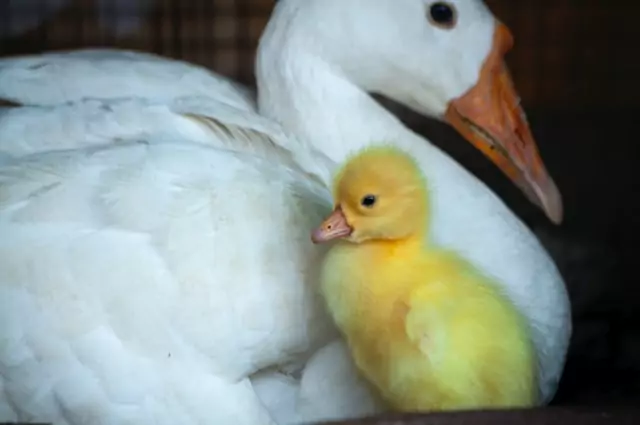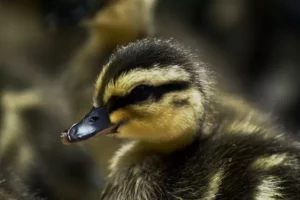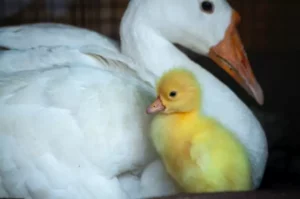0

As Easter draws near, baby ducklings are usually seen in gift baskets, but with a little planning, a little prep work, and some tender loving care, these little darlings can become valued members of the family. For those who are considering getting a pet duck, the following information might be helpful.
Ducks are remarkably hardy, inexpensive, and easy to care for. They can live up to 20 years and make loving and enjoyable pets.

Please don’t keep a duck indoors as a pet. They are not for indoors. Recognize that even while keeping your duck inside could make you happy, you are brutally treating it because it needs to live outside.
Ducks are extremely sociable animals that rarely fight one another physically. They are not solitary creatures and are prone to depression and loneliness, which makes it challenging for them to survive or thrive. Given that ducks feel loneliness, isolation, and loss similarly to humans do not leave a duck alone or in a cage for an extended period of time.
Keeping just one duck is cruel so don’t do it. Due to their gregarious nature, ducks require other ducks to live with them. It is feasible to have just one duck, but it is highly recommended that you have at least two more for the company; three or four ducks would be ideal.
A duck or any other unusual animal shouldn’t be your pet solely to make you stand out. Instead of thinking about the life you want for the animal, think about what it needs and how to provide it.
Ducks are intelligent and extremely emotional creatures. They can follow instructions, play with toys and games, give kisses, and beg for hugs just like other birds if you take the time to train them. If handled frequently and gently beginning at a young age, ducks will become quite sociable with people.
Though it could take some getting used to, you will eventually understand the activities your duck enjoys. The more you engage with your duck, the more you will bond with it.
Contrary to popular belief, ducks are capable of swimming in any open body of water, even ponds.
Ducks don’t smell or have an odor, just like hens.
Parasites like ticks and fleas don’t affect ducks.
Since it might be challenging to see the sex of ducklings, they are on display without sex. Secondary characteristics may be helpful to differentiate the sexes once completely developed. For example, in some breeds, the females don’t have a head that is primarily green.
The rules for color sexing depend on the breed. You can also recognize ducks by the sounds they make as early as 6 weeks of age. The females will begin to quack, while the males’ voices will begin to sound raspy and laryngitis-like.
The first three to four weeks are crucial for keeping ducklings warm and dry. Use a light bulb to provide heat, or place a box or cage in a warm (80 to 85 °F, or 30 °C) environment. Instead of putting the bulb in the center of the cage, place it in one of the corners to allow the animals to come and go as they want.
If they have access to a body of water that they can climb into and are alone, they run the risk of getting cold and possibly drowning.
If the weather is not too chilly, the ducklings can be safely released outside at roughly 4 or 5 weeks when their breasts are in feathers. Try to gradually acclimate them to being outside by leaving their box or cage outside for longer periods of time each day. If the weather is nice, they can be outside even when they are quite little.
The ducks don’t need a lot of covers. People should be able to escape the wind, rain, and other elements if they so want.
Up to four ducks can be in a large dog home (2 feet by three feet for 2 ducks; 3 feet by 4 feet for four ducks).
Make certain that the entrance faces away from the wind.
Insulation is not actually required, despite the possibility that the property might need it. Make an effort to organize things so that the door may not open in case it gets too cold. This is a wise decision, particularly if predators could become a problem (this includes the local dogs and cats).
If there are any other pets nearby, make sure the birds are properly protected (yours or those of anyone else).
Always use fresh straw or wood shavings as the bedding in your home.
As far as fencing goes, a three-foot (one-meter) high chicken wire enclosure or a nylon garden fence will do. Each bird needs a space of at least 10 square feet. If dogs pose a risk, the fence must be at least 4 feet high. Always keep the fence level with the ground. You can choose to simply let the ducks roam free if your yard is already completely fenced in.

Feed ducks only unmedicated food. During their first two weeks of life, the ducklings should eat duck starters, a special diet for young birds. For weeks three through seven, they should eat duck growers, which is great for growth and development. Pullet Grower, an unmedicated, lower protein chicken feed, can then come in.
The birds ought to have access to GRIT as well. To help them grind food in their gizzards, they must possess this crushed stone (they have no teeth and cannot chew). A bag of #2 grit lasts for an incredibly, incredibly long time.
Giving ducks free access to your yard will help keep it weed-free because they like to eat greens.